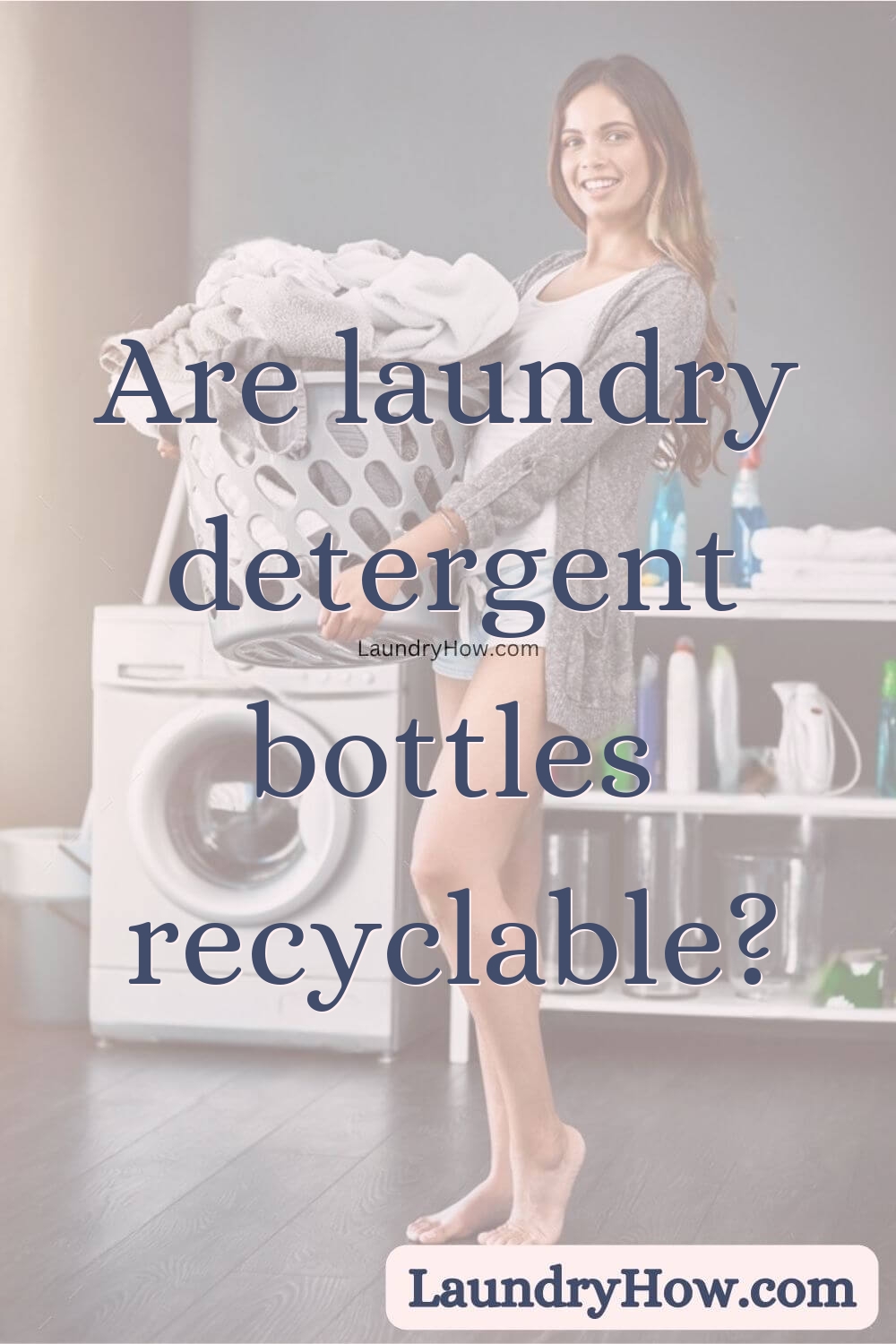Do you ever look at an empty laundry detergent bottle and wonder – can this actually be recycled? With their combination of materials like plastic and cardboard, weird shapes, and residue sticking inside, it’s normal to question if these bottles belong in the recycling bin.
In this post, we’ll break down the details on recycling empty laundry detergent containers. As we’ll discover, most of these bottles can and should be recycled despite some tricky aspects. Understanding the facts can help more of these containers get to proper recycling facilities instead of landfills.
The Key Component: Plastic #2 HDPE
The first key point is that most laundry detergent bottles are made from high-density polyethylene plastic, commonly abbreviated as HDPE. This type of plastic is labeled with the recycling symbol and number “2” on the bottom of containers.
HDPE is one of the most widely accepted plastics for recycling programs. It gets turned into many new products like milk jugs, pipes, buckets, crates, toys, food containers, and much more. Because HDPE is sturdy and flexible, it gets remade into all sorts of useful items.
So a laundry bottle made with that #2 HDPE plastic has the fundamental material that most recycling centers want. That’s good news off the bat!
Additional Materials Like Cardboard and Metal
Beyond plastic, laundry detergent containers also contain other materials like cardboard and metal. For example, many bottles have an inner cardboard sleeve for structure, plus a metal pour spout. The various materials don’t disrupt recyclability – facilities are equipped to separate paper, metal and plastics during processing.
It’s fine if small bits of cardboard and metal remain attached to your empty laundry detergent bottle. Recycling machines can screen out those secondary ingredients, so all the materials wind up in the right place.
What About Residual Laundry Detergent Inside?
Here’s another key question – what about leftover product sticking inside containers? Surely facilities don’t want soapy, sudsy residue entering their recycling machinery?
It’s a sensible concern, but recycling centers can handle small amounts of leftover liquids and soap. The processing equipment separates out organic materials from target recyclables like plastic and cardboard. Minor residues won’t disrupt the systems as long as you drain and rinse bottles reasonably well before recycling.
When in doubt, let any pooled liquid evaporate fully before tossing the container into your recycling bin. If possible, give the inside surfaces a quick swish of water and shake dry. Following those steps helps processing go smoothly!
Recap: Main Factors Supporting Recyclability
Let’s recap the key factors that allow most laundry detergent bottles to get successfully recycled:
- Made primarily from #2 HDPE plastic that recycling centers want
- Additional materials like cardboard and metal are acceptable
- Small residues of liquid/soap won’t disrupt processing equipment
- Draining/rinsing containers prevents excess goop in recycling machinery
With those points in mind, you can confidently place your emptied laundry bottles into the recycling mix! Pretty neat how they’re built for recyclability despite some seeming complexities.
Are the Caps and Lids Also Recyclable?
Along with the bottles themselves, many people reasonably ask whether recyclers will take the caps and spray nozzle components too. After all, those pieces involve extra metals and plastics added onto the main container.
We have more good news here – the lids, spray mechanisms, measuring cup tops and other attachments can certainly tag along to recycling facilities!
Those accessory parts get sorted by machinery just like the parent bottle to recover the usable materials. The metal pour spouts in particular have value for scrap metals recycling. So feel free to leave caps snapped onto spray nozzles and measuring cup tops placed into the main opening. Recyclers will take care of separating the full ensemble of parts.
Special Case: Refill/Reuse Programs
We’ve covered standard recycling for empty detergent bottles you personally use up at home. Now what about cases where companies offer refill/reuse programs?
Some brands allow customers to mail back original containers once empty instead of throwing them into home recycling. The bottles get professionally cleaned and refilled for additional usage.
In these special cases, following the mail-back refill/reuse method is better for the environment when available. But if that option isn’t offered in your area, standard recycling is still reliably eco-friendly for disposing of empty detergent packaging.
Either way – through home recycling pickup or mail-back programs – rest assured your laundry containers ultimately get turned into new materials!
Summing It All Up..
We’ve covered a lot of ground about an oddly unappreciated topic! Let’s tie together the key points:
- Most laundry detergent bottles have #2 HDPE plastic suitable for recycling
- They often mix in cardboard and metals too, but those secondary ingredients don’t interfere with processing capabilities
- Rinsing containers reasonably helps, but small residues won’t break recycling equipment
- Caps, lids and spray nozzles can all be included for recycling as well
- Some brands offer mail-back refill/reuse programs as an alternative option
While they might seem complicated, empty laundry detergent bottles are far more recyclable than most people assume. Following proper procedures, they can avoid landfills and get remade into new products. Understanding the facts now, you can cleanly recycle more of these everyday containers!
References
American Cleaning Institute. “Cleaning Product Recycling.” https://www.cleaninginstitute.org/cleaning-products/recycling
Johnson, Anna. “Making Sense of Laundry Detergent Bottles.” Earth911. January 12, 2022. https://earth911.com/home-garden/recycling-laundry-detergent-bottles/
CalRecycle. “Recycling Tips: Laundry Product Containers.” State of California. https://www2.calrecycle.ca.gov/ReduceWaste/AtSchool/Clothes

Laura has had an enthusiasm for laundry ever since she was a teenager experimenting with wash cycles. She went on study textile science in college before working in product testing.
Soon, Laura found friends and family constantly asking her laundry advice, realizing she had become an unofficial laundry guru. The questions kept coming in, so Laura decided to start sharing laundry tips online to help more people. The enthusiastic response led her start the blog “Laundry How”.
Now in her late thirties, Laura uses Laundry How to tackle all kinds of laundry topics – stains, fabric care, detergents, and more. She provides advice from both her studies and experience testing techniques out firsthand. Laura continues to grow an engaged community of laundry learners, feeling fulfilled empowering people to make laundry an easy, confidence-building ritual rather than a dreaded chore.
